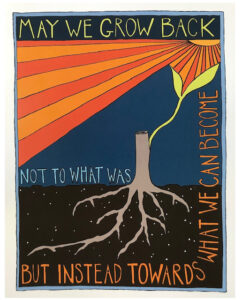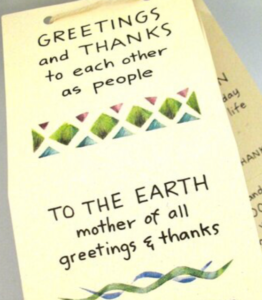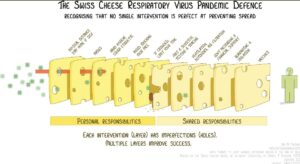Zoomsgiving
Zoomsgiving…for those you love.
November 25, 2020Merci d’exister.
Creation by Jen Bloomer, Radici Studios
A Thanksgiving Prayer
Don’t get revenge when wronged, but seek reconciliation.
Don’t repay violence with violence, but seek creative and transforming nonviolent alternatives.
Don’t focus on external conformity to moral codes, but on internal transformation in love.
Don’t love insiders and hate or fear outsiders, but welcome outsiders into a new “us,” a new “we,” a new humanity that celebrates diversity in the context of love for all, justice for all, and mutual respect for all.
Don’t have anxiety about money or security or pleasure at the center of your life, but trust yourself to the care of God.
Don’t live for wealth, but for the living God who loves all people, including your enemies.
Don’t hate your enemies or competitors, but love them and do to them not as they have done to you—and not before they do to you—but as you wish they would do for you.
[Center for Action & Contemplation]
In the COVID days ahead,
‘…give us the courage of warriors,the strength of saints,the love of new mothers,the resilience of gravity,the patience of breath,the freedom of children.’
♡
H A P P Y T H A N K S G I V I N G
Thanksgiving Harm
November 23, 2020Reduction Steps for Those Who Will Travel or Gather Anyway
There is no way to eliminate risk, but anything one does to reduce it is better than nothing
by, Zeynep Tufekci, sociologist and writer
Millions of Americans are traveling for Thanksgiving. In doing so, they’re increasing the chances of catching or spreading Covid-19—not just themselves but to others. A wedding reception in Maine ended up causing 177 cases and seven deaths—but none of the deaths were among people who attended the wedding, but rather, among their contacts.
It’s never too late to decide not to travel or choose not to meet with large groups of people not in one’s household during the holidays. There is excellent news regarding vaccines and therapeutics, and we may be very close to turning the corner on this pandemic. One can always have Thanksgiving in spring and be grateful for having survived a pandemic! As I recently wrote in The Atlantic, it’s time to hunker down!
[…]
I’d especially urge people to consider that hospitals are running out of not just space, but of qualified people. This report is a sobering read from a hospital that was otherwise very-well prepared. We can expand space within facilities and even set up field hospitals. But there is no way to mass manufacture doctors and nurses. With a nationwide surge underway, workers from one region cannot travel to bail out another, as they were able to in spring. Keeping infections down means that hospitals can do a better job taking care of the already overwhelming numbers of people who need care.
[…]
Traditionally, communal eating is the center of Thanksgiving festivities. However, it is also one of the highest risk activities, as one cannot be masked while eating, and people tend to speak loudly around a table. Eating together doesn’t have to be the centerpiece of the day, though. It’s possible to eat separately and make the highlight of the day a different group activity. A gathering outside around a fire pit would be great, for example. It’s fun and, being outdoors, it’s safer, too. Playing a board game where people keep their masks on is another alternative. Keeping masks on is especially important for multi-generational gatherings, or for groups that include higher-risk people. The minimal set-up could be that the elderly could eat separately from the rest of the group. If they must join the dining table, they can do so while wearing the highest-grade mask they have. Risk reduction is important for everyone, but it’s most important for those at most risk. It’s much better to have a much more festive gathering in spring or summer, even if it makes this Thanksgiving a little more awkward.
Getting tested before or after a group meeting is tricky. On the one hand, of course testing is a good precaution to take, and a positive test result means you absolutely should isolate! However, one can test negative even while having Covid-19, because the disease hasn’t progressed enough—and then be infected and infectious just a day or two later. I wouldn’t consider a negative test a licence to do anything differently. In other words, even if you test negative, take all the precautions that you can: stay home and don’t travel for Thanksgiving, or, if you decide to do so, quarantine and take all the harm-reduction steps you can anyway.
The same precautions apply for the return trip: travel in the least risky way possible, keeping in mind that contact with other people poses the highest risks. When you return, quarantine. The gold-standard period for quarantine is two weeks, but don’t think in binary terms. Don’t think that if you can’t do two weeks, you may as well not quarantine. Two weeks is better than a week, a week is better than nothing. When you return, it’s best to act like you might be infected.
What if you get lucky by exposing yourself to a high-risk situation and emerging untouched by Covid-19? Don’t assume that your luck will hold for the Christmas season. Every encounter is an independent risk. There is no such thing as “a winning streak” with this disease. Getting lucky once is no guarantee of being lucky a second time.The changing winter conditions and the explosion in infections means that any meeting right now is much higher risk than before, when the weather was warmer and case numbers were lower. We now have three vaccine candidates with excellent results and vaccinations will start as early as December. We have effective therapeutics—they are in short supply but manufacturing is ramping up. We will have better weather once we get through this winter season. We are so close to the finish line. The more precautions we take, the better our chances.
[Please share.]
Dr. Tufekci was getting it right back in January before many epidemiologists.
NYTimes:
How Zeynep Tufekci Keeps Getting the Big Things Right
‘Dr. Tufekci, a computer programmer who became a sociologist, sounded an early alarm on the need for protective masks. It wasn’t the first time she was right about something big.’
by Ben Smith
Credit…Felix Hörhager/Picture Alliance]


